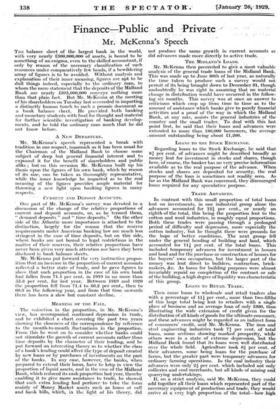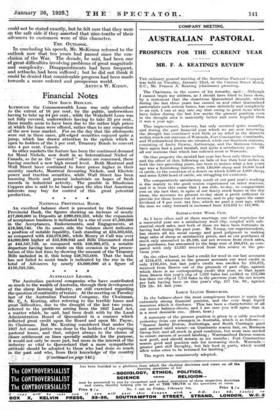Finance—Public and Private
Mr. McKenna's Speech
THE balance sheet of the largest bank in the world, with very nearly £500,000,000 of assets, is bound to be something of an enigma, even to the skilledaecountant, if only by reason of the necessary classification -of such resources under comparatively few heads, if a bewildering array of figures is to be avoided. Without analysis and explanation of their inner meaning, figures are apt to be dull things indeed, especially to the ordinary man, to whom the mere statement that the deposits of the Midland Bank are nearly £395,000,000 conveys -nothing more than that plain fact. But Mr. McKenna at the meeting of his shareholders on Tuesday last succeeded in imparting a distinctly human touch to such a prosaic document as a bank balance sheet. Re provided both banking and monetary students with food for thonght and material for further scientific investigation of banking develop- ments, and he told the ordinary man much that he did not know before.
A NEW DEPARTURE. •
Mr. McKenna's speech represented a break with tradition in one-respect, inasmuch as it has been usual for the Chairman of the Midland Bank to choose some subject of deep but general financial interest and to expound it for the benefit of shareholders and public alike ; but on. this occasion Mr. McKenna built _up his thesis upon the figures of his own bank, which by reason of its size, can be taken as thoroughly representative, while the inner knowledge he imparted as to the real meaning of the figures provides ample material for throwing a new -light upon banking figures in many respects.- - • CURRENT AND DEPOSIT AccrocYrs.
One part of Mr: McKenna's survey was devoted to. a discussion of the change of the relative proportions-of current and deposit accounts,, or, as he termed them, " demand deposits " and " time deposits." On the other side of the Atlantic more importance is attached to .the distinction, largely for the reason that the reserve requirements under American banking law are much less stringent in the case of time deposits, but on this side; where banks are not bound to • legal restrictions in the matter of their reserves, their relative proportions have never been given very much attention nor have they been disclosed in • bank balance sheets. • Mr. McKenna put forward the very -instructive propos- ition that an-increase in the proportion of current accounts reflected a better state of trade, and he gave figures to show that such - proportion .in the rase of his own bank had fallen from 71.4 per cent. -in 1919 to no more than 55.3 per 'cent. for last year; Between 1919 and -1920 the 'proportion fell from 71.4 to 66.2 per cent., then to 60.3 in the following year, and.froin that time onwards there. has been a slow but constant decline. , - MEANING OF THE FALL.
The reduction in the proportion, in Mr. McKenna's view, has accompanied, continued depression in trade, and -he exhibited a chart covering the past two years showing the closeness of the correspondence by reference to the montkto-month fluctuations in the proportion. From this he went on to consider whether banks could not stimulate the-growth of current accounts rather than time deposits by the character of their lending, and he put forward an interesting theory as to whether the class ofa bank's lending could affect the type of deposit created by new loans or by pilrehaseS of-investments on the part of the banks. In any case, ho*ever, the hanks, when prepared to extend their loans, have to keep in view the proportion of liquid assets, and in the case of the Midland Bank, which reduced its sash proportion last year, thereby enabling it to give more assistance to trade, he showed that such extra lending had perforce -to take the form mainly of Money Market assets such as loans at call and bank bills, which, the light of his theory, did not produce the same growth in current accounts as did advances made more directly to active trade.
THE MIDLAND'S LOANS.
Mr. McKenna then proeeeded to give a most valuable analysis of the general trade loans of the Midland Bank. This was made up to June 30th of last year, as naturally the time taken to produce such a survey would not permit of its being brought down to December 81, though undoubtedly he was right in assuming that no material change in distribution would have occurred in the follow- ing six months. This survey was at once an answer to criticisms which crop up from time to time as to the amount of assistance which banks give to purelY financial activities and a proof of. the way in which the Midland Bank, at any rate, assists the general industries of the country and the small trader.' To deal with this last point first, he said that their- loans and advances were extended to- more than 180,000 borrowers, the average . amount -outstanding being about £1,200.
LOANS TO THE STOCK EXCHANGE. • Regarding loans to the Stock Exchange, he said that 8t per cent. of advances might be described broadly as money lent for investment in stocks and shares, though here, of course, the banker has no very precise information available as to the real purpose of the advance. When stocks and. shares. are deposited for security, the real purpose • of the loan is sometimes not readily seen. As far as the Midland Bank was -concerned, they diacmiraged loans required for any speculative purpose.
TRADE ADVANCES.
In contrast with this small proportion of total loans lent on investments, in one industrial group alone the advanceS accounted for 121 per cent., or nearly an eighth of the total,- this being the proportion lent to the cotton and wool industries, in roughly equal proportions. Both these trades were passing through a prolonged period of difficulty and depression, more -especially the cotton industry, but he thought there were grounds for the hope of better conditions. The next group- fell under the general heading of building and land, which accounted for ilk per cent.. of the total loans. This included- temporary advances for investment in houses and land and for the purchase or construction of houses for the buyers' own occupation, but the larger part of the money was lent direct to- builders,- eontractors, brick- makers, &c. As loans for building purposes were almost invariably repaid on completion of the contract or sale of the building, a high degree of liquidity was characteristic of this group. LOANS TO RETAIL TRADE.
Then came loans to wholesale and retail traders also with a percentage of 1i per cent., more thaii.two-fifths of this large total being lent to retailers with a -single Place of business and an average loan of only £880, thus illustrating the wide extension of credit given for the distribution of all kinds of goods for the ultimate consumer, and these advances might be regarded as an indirect forin of consumers' credit, said Mr. •McKenna. The iron and steel engineering industries took 71 per cent. of total loans, some sections showing marked prosperity, while others were in a_ state. of extreme depression, Ink the Midland Bank found- that its loans were well distributed over the whole field. Agriculture took 64. per cent. of their advances, some being loans for the purchase of farms, but the greater part were temporary advances for 'ordinary farming operations. In-the coal industry their advances were only 2I per cent. which included not only collieries and coal merchants, but all kinds of mining and quarrying undertakings.
If, on a strict analysis, said Mr. McKenna, they could add together all their loans which represented part of the necessary equipment of production and trade; they would arrive at a very high proportion of the total—how high could not be stated exactly, but he felt sure that they were on the safe side.if-they-asseited that iiihe-tenths, of their advances to customers were of this character. Tna -01.1Troox.. -- In concluding his speech, Mr. McKenna referred to the outlook now that ten years had passed since the con- cliislon of the War. The deCide, he said, had been one of great difficulties involving problems of great magnitUde and complexity. Disappointments had been frequent,and setbacks; tad been suffered but he did not think it could be denid that considerable progress had been made. towards a more ordered and prosperous world.
ARTHUR W. KIDDY.









































 Previous page
Previous page